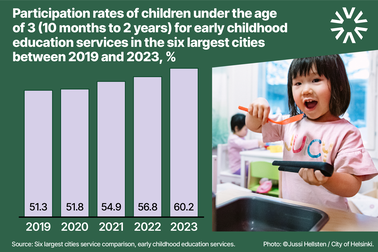
The pandemic situation in the capital region is steadily improving and the last few weeks have seen the easing of many restrictions. Starting 1 March, the Helsinki Metropolitan Area coronavirus coordination group recommends that employers begin a gradual transition back to hybrid work arrangements. As society begins to open up, members of the public and organisers of activities must do their best to act responsibly and follow the appropriate health security measures.
Coronavirus infections are still widespread throughout the metropolitan area. The burden placed on hospitals by coronavirus patients in both intensive care units and wards has fallen from last week’s level, but at a slower pace.
As restrictions are lifted, it is more important than ever for everyone to behave conscientiously. Public premises and customer service facilities must do their part by upholding measures that prevent the spread of the virus (Section 58c of Finland’s Communicable Diseases Act). This includes ensuring that people can wash or sanitize their hands during their visit, and the posting of visible instructions on handwashing, maintaining safe distances and other preventative practices. Intensified cleaning of the premises and surfaces should also continue.
Premises and facilities must also arrange their customer and participant seating in such a way that people can maintain safe distances from each other. The above-mentioned requirements, pursuant to Section 58c of the Communicable Diseases Act, will be legally valid without the need for any separate decisions until 30 June 2022.
The coordination group recommends that health security measures also be observed in private events. Attendance should be limited to asymptomatic participants and everyone should practice good hand hygiene and maintain safe distances.
An extensive face mask recommendation is currently in effect in the Helsinki metropolitan area. The use of face masks in indoor public spaces and on public transportation continues to be recommended for everyone over the age of 12, regardless of their level of vaccination protection. It is also recommended that students in the sixth grade and older continue to use face masks at school. There is no justification for organisers of activities to relax their face mask recommendations at this time.
The coordination group did, however, make a decision to waive the face mask recommendations for schoolchildren in grades 3-5, starting on 1 March. These young students can still use face masks if they desire, and face masks will continue to be made available from the schools.
Metropolitan Area coronavirus coordination group coordinates and prepares local decision-making
The cities of Helsinki, Espoo and Vantaa, the Finnish Institute for Health and Welfare (THL), the Hospital District of Helsinki and Uusimaa (HUS), and the Regional State Administrative Agency for Southern Finland established the Metropolitan Area coronavirus coordination group on 10 September 2020. In line with a regional operating model devised by Finland’s Ministry of Social Affairs and Health, the group aims to strengthen the formation of a common situational assessment and to coordinate and prepare local and regional measures.
The group consists of top management from each member organisation and is responsible for the preparation and coordination of decision-making based on a shared assessment of the situation. Each member makes decisions independently, within its own sphere of authority. The group further intensifies the close metropolitan area collaboration that has continued throughout the coronavirus crisis.
The City of Helsinki is responsible for organising the group’s operations.
The City of Kauniainen joins Helsinki, Espoo and Vantaa in adhering to the group’s recommendations and restrictions.
Read more
Coronavirus updates from Helsinki
Photo: Maarit Hohteri


